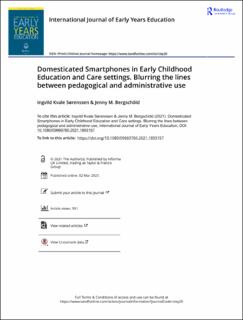Domesticated Smartphones in Early Childhood Education and Care settings. Blurring the lines between pedagogical and administrative use
Peer reviewed, Journal article
Published version

Åpne
Permanent lenke
https://hdl.handle.net/11250/2983647Utgivelsesdato
2021Metadata
Vis full innførselSamlinger
Originalversjon
International Journal of Early Years Education. 2021, . 10.1080/09669760.2021.1893157Sammendrag
In Norway’s ‘Framework Plan for kindergartens’ digital tools are to be implemented for learning, play and creativity. Implicitly the concept of digital tools, or ICTs, tend to be tablets, computers, and interactive whiteboards, smartphones are as such not taken into account. However, we find that the smartphone is particularly interesting because it differs from the other types of ICTs used in Early childhood education and care (ECEC) institutions. Tablets, computers and interactive whiteboards, are all implemented as distinctly pedagogical tools, potentially fulfilling the framework plan, while smartphones have been implemented primarily as administrative and documentational tools. Yet, in this case study on the use of ICTs in a Norwegian ECEC we found that such administrative use of smartphones was blended with undercurrents of ‘filler use’ for pedagogical purposes. In this article we build on the literature on ICT’s in ECEC by exploring the outcome such filler use of smartphones may have. To do this we draw on the domestication theory to describe the practice, symbolic and meaning dimensions in the enactment of smartphones in an ECEC setting.
